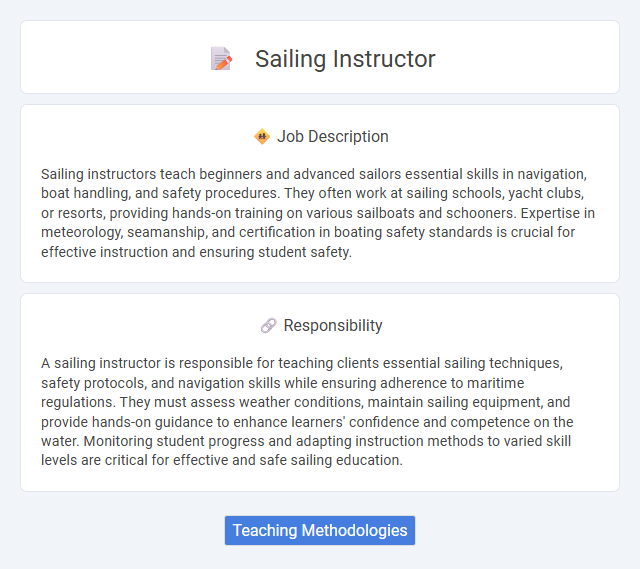
Sailing instructors teach beginners and advanced sailors essential skills in navigation, boat handling, and safety procedures. They often work at sailing schools, yacht clubs, or resorts, providing hands-on training on various sailboats and schooners. Expertise in meteorology, seamanship, and certification in boating safety standards is crucial for effective instruction and ensuring student safety.
Individuals with strong physical fitness and a passion for the outdoors are likely well-suited for a sailing instructor job due to the demands of managing boats and teaching practical skills on the water. Those with excellent communication skills and patience may have a higher probability of success, as instructing beginners requires clear guidance and the ability to handle varying skill levels calmly. People who enjoy teamwork and can adapt to unpredictable weather conditions might find this role particularly fulfilling and sustainable.
Qualification
A sailing instructor must possess certifications such as the International Sailing Schools Association (ISSA) or American Sailing Association (ASA) qualifications to ensure proficiency in teaching various sailing techniques. Extensive experience in different sailing vessels and strong knowledge of safety protocols, navigation, and weather patterns are essential for effective instruction. Excellent communication skills and the ability to assess and adapt to students' skill levels enhance the learning experience and promote safe sailing practices.
Responsibility
A sailing instructor is responsible for teaching clients essential sailing techniques, safety protocols, and navigation skills while ensuring adherence to maritime regulations. They must assess weather conditions, maintain sailing equipment, and provide hands-on guidance to enhance learners' confidence and competence on the water. Monitoring student progress and adapting instruction methods to varied skill levels are critical for effective and safe sailing education.
Benefit
Working as a sailing instructor likely offers significant benefits such as the opportunity to develop strong leadership skills and deep knowledge of marine navigation. This role probably provides a chance to work outdoors in a dynamic environment, promoting physical fitness and stress reduction. Furthermore, sailing instructors might enjoy flexible schedules and the satisfaction of fostering confidence and skills in others.
Challenge
The role of a sailing instructor likely involves navigating unpredictable weather and varying skill levels, presenting continuous challenges that require adaptability and quick decision-making. Teaching complex maneuvers to students with different learning speeds may demand strong communication skills and patience. The probability of encountering safety concerns means instructors must consistently prioritize risk management and emergency preparedness.
Career Advancement
Sailing instructor roles offer significant career advancement opportunities through certifications from recognized maritime organizations such as the American Sailing Association (ASA) and Royal Yachting Association (RYA). Experienced instructors can progress to advanced positions like race coaching, flotilla leading, or maritime safety training. Developing expertise in sailboat handling, navigation, and leadership enhances prospects for managerial roles within sailing schools or charter companies.
Key Terms
Teaching Methodologies
A sailing instructor utilizes practical, hands-on training combined with theoretical knowledge to ensure comprehensive skill development in navigation, sail handling, and safety protocols. Emphasis is placed on adaptive teaching methods tailored to individual learning paces and environmental conditions, promoting confidence and competence on the water. Continuous assessment and real-time feedback enhance skill retention and decision-making essential for safe and efficient sailing.
 kuljobs.com
kuljobs.com